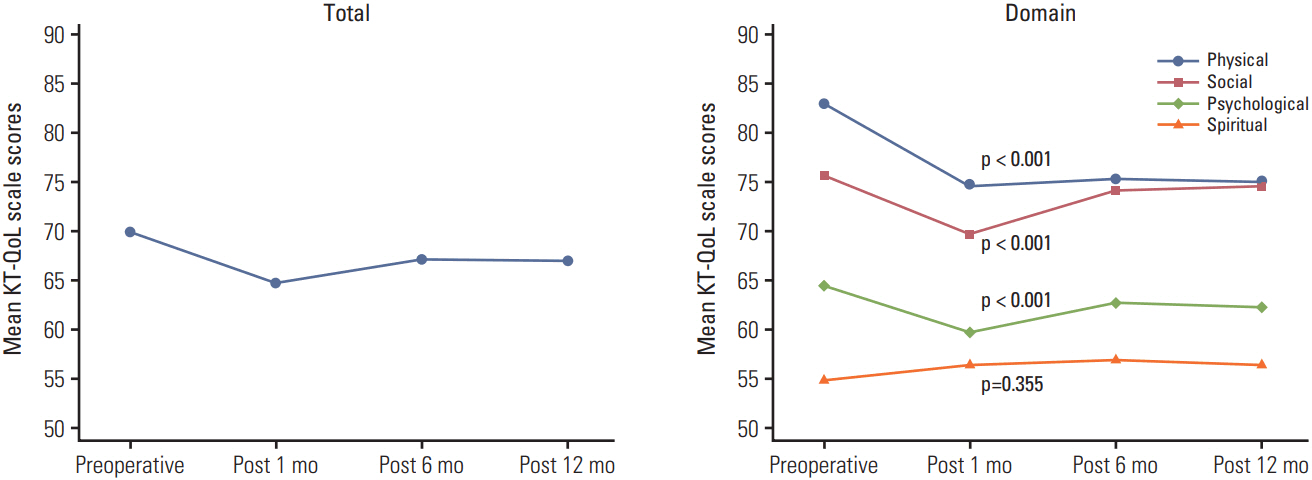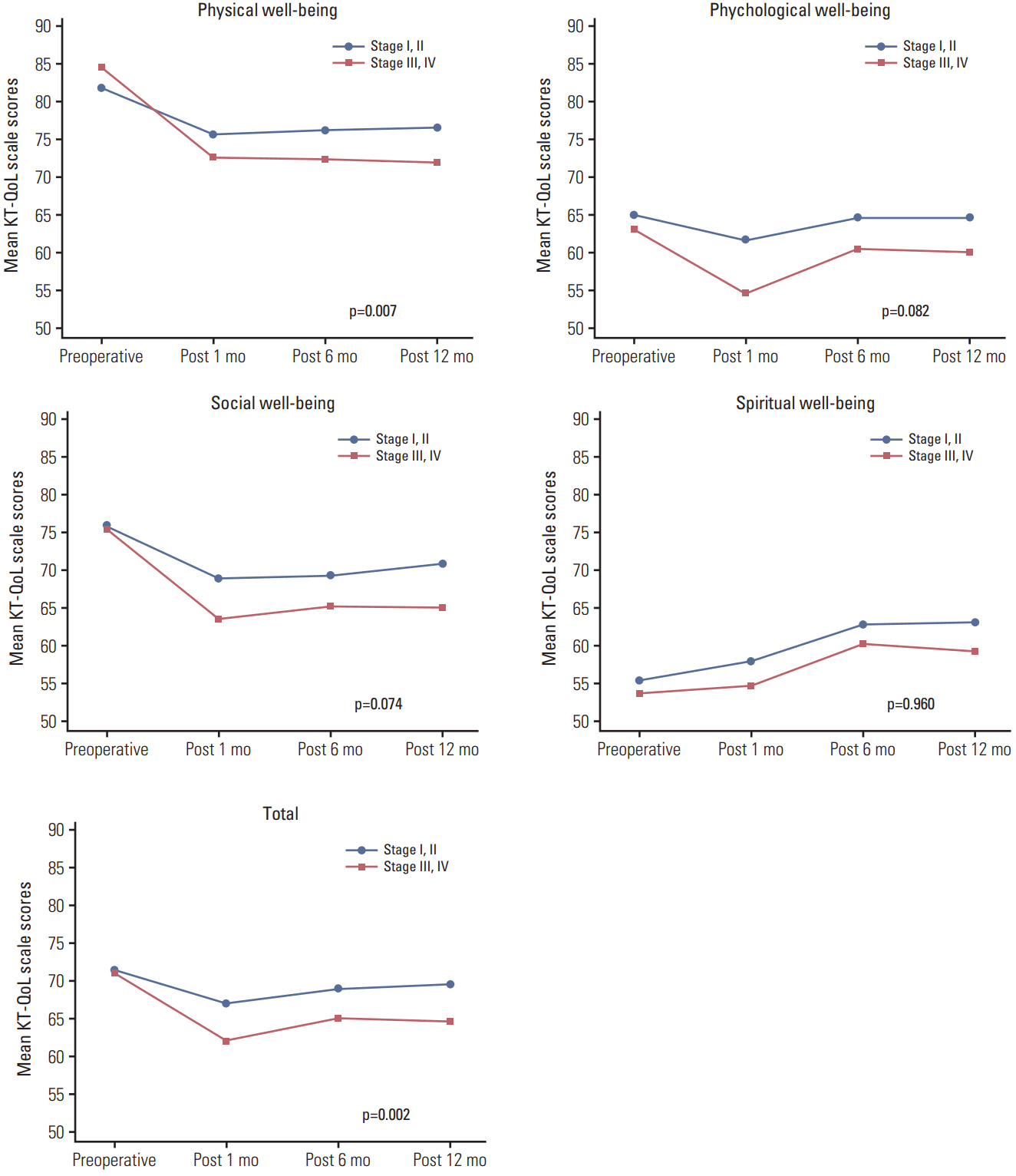Development and Evaluation of a Korean Version of a Thyroid-Specific Quality-of-Life Questionnaire Scale in Thyroid Cancer Patients
- Affiliations
-
- 1Department of Otolaryngology-Head and Neck Surgery, Center for Thyroid Cancer, Research Institute and Hospital, National Cancer Center, Goyang, Korea. jysorl@ncc.re.kr
- 2Biometrics Research Branch, Research Institute and Hospital, National Cancer Center, Goyang, Korea. jooj@ncc.re.kr
- 3Departement of Internal Medicine, Center for Thyroid Cancer, Research Institute and Hospital, National Cancer Center, Goyang, Korea.
- KMID: 2411130
- DOI: http://doi.org/10.4143/crt.2017.012
Abstract
- PURPOSE
The purpose of this study was to develop a Korean version of the self-reported thyroid-specific quality of life (QoL) questionnaire for thyroid cancer patients (KT-QoL), and to evaluate its reliability and validity.
MATERIALS AND METHODS
Two hundred seventy-two patients who underwent thyroidectomy from January to December 2010 were recruited in this study. The original version of the thyroid QoL was translated into Korean and evaluated for its reliability and validity. Using the developed KT-QoL, the postoperative QoL was evaluated until postoperative 1 year.
RESULTS
At the preoperative baseline, the item internal consistency (IIC) ranged from −0.19 to 0.76, with low IIC values for items 2, 17, and 27. Item discriminant validity ranged from 86% to 97%. These values were similar at the postoperative periods. The internal consistency reliability (Cronbach's α) was high for all dimensions, ranging from 0.90 to 0.95. The test-retest reliability (intraclass correlation coefficient) was acceptable (0.74-0.82). The external validity examined by the correlation between the item 1j (voice changes) of KT-QoL and the voice handicap index-30 ranged from 0.51 to 0.75. Patients' QoL scores decreased after surgery, which demonstrated the sensitivity of the questionnaire. The QoL scores in patients with lobectomy showed best QoL scores postoperatively and those with receiving radioactive iodine still showed decreased QoL scores along the postoperative periods.
CONCLUSION
These results demonstrate that KT-QoL is a valid instrument for evaluating QoL of Korean patients with thyroid cancer.
Keyword
MeSH Terms
Figure
Cited by 3 articles
-
Study Protocol of Multicenter Prospective Cohort Study of Active Surveillance on Papillary Thyroid Microcarcinoma (MAeSTro)
Jae Hoon Moon, Ji-hoon Kim, Eun Kyung Lee, Kyu Eun Lee, Sung Hye Kong, Yeo Koon Kim, Woo-jin Jung, Chang Yoon Lee, Roh-Eul Yoo, Yul Hwangbo, Young Shin Song, Min Joo Kim, Sun Wook Cho, Su-jin Kim, Eun Jae Jung, June Young Choi, Chang Hwan Ryu, You Jin Lee, Jeong Hun Hah, Yuh-Seog Jung, Junsun Ryu, Yunji Hwang, Sue K. Park, Ho Kyung Sung, Ka Hee Yi, Do Joon Park, Young Joo Park
Endocrinol Metab. 2018;33(2):278-286. doi: 10.3803/EnM.2018.33.2.278.Care and Management of Voice Change in Thyroid Surgery: Korean Society of Laryngology, Phoniatrics and Logopedics Clinical Practice Guideline
Chang Hwan Ryu, Seung Jin Lee, Jae-Gu Cho, Ik Joon Choi, Yoon Seok Choi, Yong Tae Hong, Soo Yeon Jung, Ji Won Kim, Doh Young Lee, Dong Kun Lee, GIljoon Lee, Sang Joon Lee, Young Chan Lee, Yong Sang Lee, Inn Chul Nam, Ki Nam Park, Young Min Park, Eui-Suk Sung, Hee Young Son, In Hyo Seo, Byung-Joo Lee, Jae-Yol Lim
Clin Exp Otorhinolaryngol. 2022;15(1):24-48. doi: 10.21053/ceo.2021.00633.A Phase II Multi-Center, Non-Randomized, Parallel Group, Non-Inferiority Study to Compare the Efficacy of No Radioactive Iodine Remnant Ablation to Remnant Ablation Treatment in Low- to Intermediate-Risk of Papillary Thyroid Cancer: The MOREthyroid Trial Protocol
Eun Kyung Lee, You Jin Lee, Young Joo Park, Jae Hoon Moon, Ka Hee Yi, Koon Soon Kim, Joo Hee Lee, Sun Wook Cho, Jungnam Joo, Yul Hwangbo, Sujeong Go, Do Joon Park
Endocrinol Metab. 2020;35(3):571-577. doi: 10.3803/EnM.2020.681.
Reference
-
References
1. Siegel R, Naishadham D, Jemal A. Cancer statistics, 2013. CA Cancer J Clin. 2013; 63:11–30.
Article2. Haugen BR, Alexander EK, Bible KC, Doherty GM, Mandel SJ, Nikiforov YE, et al. 2015 American Thyroid Association management guidelines for adult patients with thyroid nodules and differentiated thyroid cancer: The American Thyroid Association Guidelines Task Force on Thyroid Nodules and Differentiated Thyroid Cancer. Thyroid. 2016; 26:1–133.
Article3. Perros P, Boelaert K, Colley S, Evans C, Evans RM, Gerrard GE, et al. Guidelines for the management of thyroid cancer. Clin Endocrinol (Oxf). 2014; 81 Suppl 1:1–122.
Article4. Verburg FA, Mader U, Tanase K, Thies ED, Diessl S, Buck AK, et al. Life expectancy is reduced in differentiated thyroid cancer patients ≥ 45 years old with extensive local tumor invasion, lateral lymph node, or distant metastases at diagnosis and normal in all other DTC patients. J Clin Endocrinol Metab. 2013; 98:172–80.
Article5. Maier TM, Schober O, Gerss J, Gorlich D, Wenning C, Schaefers M, et al. Differentiated thyroid cancer patients more than 60 years old paradoxically show an increased life expectancy. J Nucl Med. 2015; 56:190–5.
Article6. Lang BH, Wong CK, Tsang JS, Wong KP. A systematic review and meta-analysis comparing outcomes between roboticassisted thyroidectomy and non-robotic endoscopic thyroidectomy. J Surg Res. 2014; 191:389–98.
Article7. Randolph GW, Dralle H; International Intraoperative Monitoring Study Group, Abdullah H, Barczynski M, Bellantone R, et al. Electrophysiologic recurrent laryngeal nerve monitoring during thyroid and parathyroid surgery: international standards guideline statement. Laryngoscope. 2011; 121 Suppl 1:S1–16.
Article8. Van Nostrand D. The benefits and risks of I-131 therapy in patients with well-differentiated thyroid cancer. Thyroid. 2009; 19:1381–91.
Article9. Bilimoria KY, Bentrem DJ, Ko CY, Stewart AK, Winchester DP, Talamonti MS, et al. Extent of surgery affects survival for papillary thyroid cancer. Ann Surg. 2007; 246:375–81.
Article10. Husson O, Haak HR, Oranje WA, Mols F, Reemst PH, van de Poll-Franse LV. Health-related quality of life among thyroid cancer survivors: a systematic review. Clin Endocrinol (Oxf). 2011; 75:544–54.
Article11. Han CW, Lee EJ, Iwaya T, Kataoka H, Kohzuki M. Development of the Korean version of Short-Form 36-Item Health Survey: health related QOL of healthy elderly people and elderly patients in Korea. Tohoku J Exp Med. 2004; 203:189–94.
Article12. Yun YH, Park YS, Lee ES, Bang SM, Heo DS, Park SY, et al. Validation of the Korean version of the EORTC QLQ-C30. Qual Life Res. 2004; 13:863–8.
Article13. Lee EH, Chun M, Kang S, Lee HJ. Validation of the Functional Assessment of Cancer Therapy-General (FACT-G) scale for measuring the health-related quality of life in Korean women with breast cancer. Jpn J Clin Oncol. 2004; 34:393–9.
Article14. Dow KH, Ferrell BR, Anello C. Quality-of-life changes in patients with thyroid cancer after withdrawal of thyroid hormone therapy. Thyroid. 1997; 7:613–9.
Article15. Ryu J, Ryu YM, Jung YS, Kim SJ, Lee YJ, Lee EK, et al. Extent of thyroidectomy affects vocal and throat functions: a prospective observational study of lobectomy versus total thyroidectomy. Surgery. 2013; 154:611–20.
Article16. American Thyroid Association (ATA) Guidelines Taskforce on Thyroid Nodules and Differentiated Thyroid Cancer, Cooper DS, Doherty GM, Haugen BR, Kloos RT, Lee SL, et al. Revised American Thyroid Association management guidelines for patients with thyroid nodules and differentiated thyroid cancer. Thyroid. 2009; 19:1167–214.
Article17. Fayers PM, Machin D. Quality of life: the assessment, analysis and reporting of patient-reported outcomes. 3rd ed. New Jersey, NJ: Wiley Blackwell;2015.18. Ware JE Jr, Gandek B. Methods for testing data quality, scaling assumptions, and reliability: the IQOLA Project approach. International Quality of Life Assessment. J Clin Epidemiol. 1998; 51:945–52.19. Ryu CH, Ryu J, Ryu YM, Lee YJ, Lee EK, Kim SK, et al. Administration of radioactive iodine therapy within 1 year after total thyroidectomy does not affect vocal function. J Nucl Med. 2015; 56:1480–6.
Article20. Quality of Life: thyroid version [Internet]. Duarte, CA: City of Hope National Medical Center and Beckman Research Institute;2000. [cited 2016 Dec 28]. Available from: http://prc.coh.org/QOL-Thy.pdf.21. Hauch A, Al-Qurayshi Z, Randolph G, Kandil E. Total thyroidectomy is associated with increased risk of complications for low- and high-volume surgeons. Ann Surg Oncol. 2014; 21:3844–52.
Article
- Full Text Links
- Actions
-
Cited
- CITED
-
- Close
- Share
- Similar articles
-
- Validation of the Korean version of the thyroid cancer-specific quality of life questionnaire
- Clinical Factors Associated with Quality of Life in Patients with Thyroid Cancer
- Structural Equation Modeling on Health-related Quality of Life among Patients with Thyroid Cancer
- Vision of Thyroid Surgery: Past, Present and Future
- Preoperative Staging of Well Differentiated Thyroid Cancer: US Is Enough?




